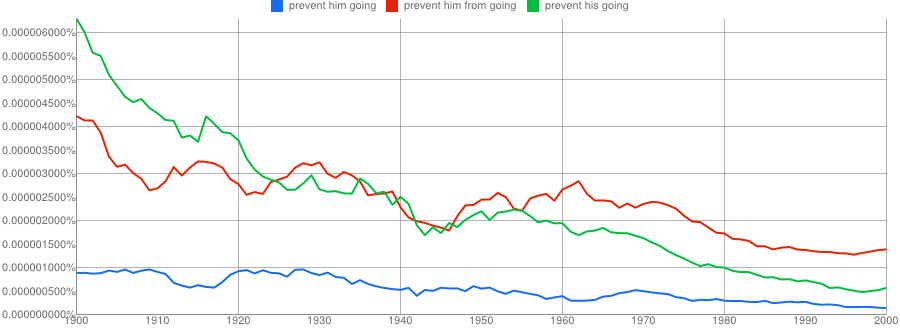It seems to me that the "from" is unnecessary and perhaps redundant.
-
2The "from" is essential unless you are (or want to sound like) a 2 year old.– user22856Commented Jun 26, 2012 at 17:06
-
2I think, omitting "from" is more American.– user20934Commented Jun 26, 2012 at 17:10
-
1@rudra: I thought Americans prefer "from" in such sentence construction.– Fr0zenFyrCommented Jun 26, 2012 at 17:21
-
5@Curtis Anderson: I can't stop you writing whatever you like in a comment - but are you seriously suggesting I sound like a 2 year old because I didn't start this sentence with "I can't stop you from writing..."? I think your concept of grammaticality is questionable, to say the least.– FumbleFingersCommented Jun 26, 2012 at 18:49
-
1@rudra,Fr0zenFyr: In fact, if you follow the NGram link in my answer, and switch corpora to US/UK-only, there's a faint suggestion Brits are more likely to omit "from". But predominantly, both sides of the pond do include it.– FumbleFingersCommented Jun 26, 2012 at 20:26
4 Answers
I think unnecessary and redundant are somewhat "loaded" terms in this context. In fact, we usually do include the preposition "from"...

...and I think only a pedant would argue for or against any of those three, in almost all contexts.
Comparing UK/US-only usage on that NGram suggests Brits may be slightly more likely to omit "from", but that hardly seems significant. The main factor affecting usage for all native speakers is that we're more likely to drop the preposition in simple constructions. Thus...
"You can't prevent me going!"
...is immediate and unambiguous (though many of us might prefer "stop"). On the other hand...
"You can't prevent an unemployed person watching daytime TV from drinking too much"
...is something of a garden path sentence. I highlighted the word "from" so you'd see it coming.
If I hadn't highlighted the word, you might well have assumed it before "watching". And then been forced to re-analyse later, when you finally came to the actual word explicitly stated. Which could have been even later - I could have written "You can't prevent an unemployed person watching daytime TV drinking too much from dying young" (forget the missing "and's" and commas).
-
1I only said "in almost all contexts" to cover myself against some context I can't think of. It seems to me they're probably all equivalent in all contexts. Commented Jun 26, 2012 at 18:59
Answer is yes as well as no . If you omit "from", on some occasions, the sentence would still mean the same thing but mostly, it will not be sufficient without "from" to express the meaning. Without "from", the sentence mostly takes a different construction (I'll give examples at the bottom).
It is safe to use "from" to modify the object where required. Without "from" in the sentence construction, an english speaker might need an extra moment to grasp the intent of the phrase. However, I searched on The British National Corpus (BNC) and found that "from" was omitted on many occasions.
Consider in these examples from BNC: "Instinctively, to prevent her falling, I grabbed her hand (it was buttocks on BNC)" and "That did not prevent her from being thrown down a mineshaft to her death in 1918." In second sentence, if you omit "from" the meaning changes completely.
Ref: bnc.bl.uk/saraWeb.php?qy=prevent+her&mysubmit=Go. (You will find hundreds of examples here) though I think its is a recommended to use "from" for a North American.
-
By the way, The British National Corpus (BNC) is a 100 million word collection of samples of written and spoken language from a wide range of sources, designed to represent a wide cross-section of current British English, both spoken and written. Commented Jun 26, 2012 at 17:23
-
2I don't understand why you say "if you omit 'from' the meaning changes completely". The meaning is the same, so far as I'm concerned. For stylistic reasons, all speakers (not just Americans) tend only to discard "from" in simple constructions (if they do it at all). It never changes the meaning - all it ever does is make complex constructions harder to "parse", which explains that tendency. Commented Jun 26, 2012 at 22:39
OOD offers this meaning:
8 Indicating prevention.
'the story of how he was saved from death'
In "prevent somebody from doing something" prevent and from are redundant but not wrong. "Prevent somebody doing something." is less redundant so I would go with that. My rule is don't use two words when one will do.
-
I know that this is old but I wanted to offer a different take. Commented Jun 13, 2017 at 21:45
I wouldn't say it's a matter of being "unnecessary" and "redundant."
If we take the case of "stop" as a precedent, yes, you could in fact cancel the "from" and just say:
stop me smoking
But the original is still very much practiced:
stop me from smoking
With "prevent," it's a bit different because it seems possible especially when we're using Possessive Adjectives:
Ex. prevent his joining
prevent their coming
But since we're merely cancelling the "from," in "prevent from," we'll be left with an Object Pronoun, not a Possessive Adjective.
Ex. Prevent him joining
Prevent them coming
This is why I would still prefer to use "prevent" with "from."
